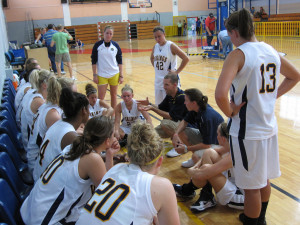How to Structure the Pre-Game Team Talk

For many teams the Pre-Game Team Talk is the final opportunity for preparation and last minute communication. While this is correct for a number of reasons there is also a fine line to be walked by a coach in delivering their message with clarity and precision and losing the team in the deep abyss of too much information. To ensure the later does not happen, or at the very least limited in opportunity, a coach must be deliberate in their planning and have a clear understanding of what they want to achieve during the pre-game team talk.
The pre-game team talk should solidify the training sessions and discussions a coach has had with the team and its individuals over the period leading up to the game. The pre-game team talk is not a time for introducing new information or strategies. It instead is about reinforcing what has been previously said.
Opposition Description
The first suggested area of discussion during the pre-game team talk is to focus around the opposition. Aspects such as their strengths and weaknesses, offense and defence, styles or habits of play will be highlighted here. This is where the big picture is described to the team about their opposition.
During this section of the pre-game team talk, the tone should be clinical and very measured. Overstating the opposition’s strengths will only serve to reinforce the size of the task ahead of the team. Players will probably have a very realistic view of the situation and will not this reinforced by their coach who should be their number one advocate.
Team Goals
The next stage of the pre-game team talk should be around the team goals that will lead to a successful outcome. Success is not limited to focusing on winning. This maybe one facet of a team’s focus, but it should by no means be the only measurement on how the team’s performance is to be viewed following a game. If it is, then a coach will only serve to compound their loses over the course of a season as they will never progress towards victory, they will always be jumping to clutch at it with this one and done mindset.
Also covered during this time of the pre-game team talk will be the announcement of the starters for the game. For some teams the Starting Line-Up will change depending on the opposition or tactical changes to the teams play specific to the atmosphere of the game. These changes and reasons for them can be mentioned during this time.
Going hand in hand with the starting line-up will be the Defensive Match-Ups for the game. When speaking about these match-ups it is recommended to do so from a positional perspective as the next stage of the pre-game team talk will be where individuals are linked to the specifics of what they need to do to have the team compete.
Individual Goals
The individual gaols stage will be where each individual is given their roles for the game. This should be a reinforcement of all the conversations between a coach and the individuals of the team over the course of the week (or however long between games). Each individual’s tasks will now be discussed with everyone receiving direction.
This will also be the time in which the specific strategies and tactics will be discussed around defensive match-ups. Players can be groups to help with delivery by position, size, or whom they will be guarding.
Inspiration
The final stage of the pre-game team talk should be a positive experience for all involved. For some teams this will be a quiet and focused time. For others it will be loud and energetic. No matter what the strategy that works for the team, they should leave this part of the talk with a positive mindset and feeling capable of competing.
The reason for structuring a pre-game team talk like this is to start the focus of the team and its players as broad as possible before drilling down to a fine point how each individual’s role will help the overall goals. This will help promote responsibility and accountability within each player, which in turn helps develop ownership of the group over their successes and failures.



Leave a Reply